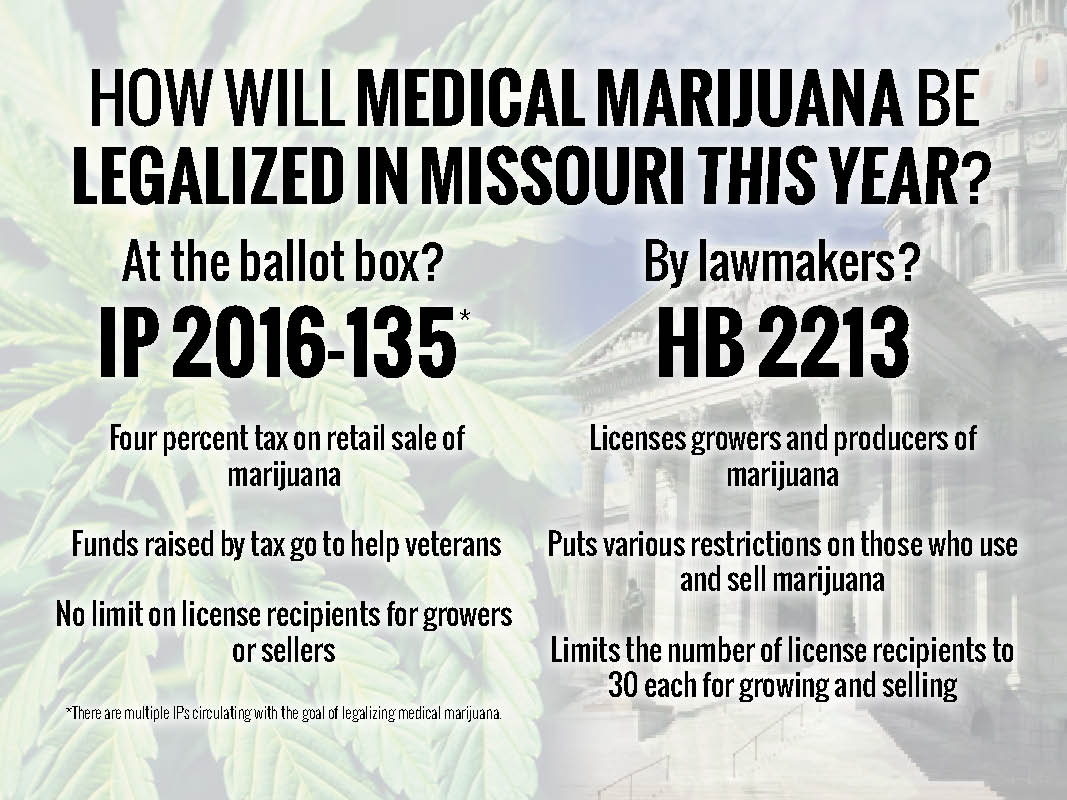JEFFERSON CITY, Mo. – The legalization of cannabis, marijuana and hemp have slowly and steadily made progress across the United States, with 23 states and the District of Columbia having legalized medical marijuana in some way and three states ending their prohibition on the substance entirely.
Missouri has become another battleground in the fight over medical marijuana, with multiple bills filed in the General Assembly this year and five separate initiative petitions set to go on the ballot this November. One of the IPs, promoted by Show Me Cannabis, would legalize marijuana in all forms, including recreational, but the legislature is actively trying to pass legislation that would limit it to medical marijuana.

In the next two weeks, we should know if Speaker Todd Richardson, Senate President Pro Tem Ron Richard and company will even have a say in the state’s marijuana policy as time runs out both in the legislative session and for final signature collection for initiative petitions.
The best hope for the General Assembly is likely HB 2213, sponsored by Rep. Dave Hinson, R-St. Clair, but the legislature may also be saved by an opposing initiative – Initiative 2016-135, which is being supported by New Approach Missouri. While other bills and initiative-petitions focus on total legalization of marijuana, HB 2213 and IP 135 both focus on legalizing medical cannabis.

Both of these measures would allow for doctors to prescribe cannabis to their patients with certain specified debilitating illnesses, including HIV-AIDS, cancers, Parkinson’s, Alzheimer’s, epilepsy, multiple sclerosis, glaucoma, Lou Gehrig’s disease and others. Both would allow for licensing to create certified producers and distributors of medical cannabis and marijuana in the state, and both would offload most of the minutia of regulation to the certain departments in the executive branch.
However, the differences within the two measures have caused some divide amongst their proponents.
First, one of the measures is statutory language while another is a ballot measure that would amend the state Constitution, although HB 2213 does have a referendum clause that would put the legislation to a vote of the people. Technically, both measures will be finalized by popular vote. Missouri’s General Assembly will not have the final say in whether or not its state becomes the 24th state to legalize in some form.
Local entities like municipalities would also have a bit more say in Hinson’s bill than the petition, which has more centralized control. In HB 2213, cities, townships and other political subdivisions could make zoning laws that would limit or even prohibit the growing of cannabis. The petition does not specify anything of the sort.
HB 2213 is designed to limit the sale and production of marijuana or cannabis to a few dispensaries and growers while IP 135 is much more broad in its measures. For example, HB 2213 would limit the number of licenses issued by the Division of Alcohol and Tobacco Control within the Department of Public Safety to just 30 for growers and producers and 30 for dispensaries. IP 135 has no such provision limiting licenses.
Eapen Thampy, executive director for Heartland Priorities, has said in the past that this provision could restrict the market.
“This is a state that respects and values economic freedom,” Thampy said in March. “It’s all about opportunity. If we’re going to have a new market, why do we want to restrict entrepreneurs and economic activity from coming to the state? Why do we want to create economic systems or market systems where only the rich get to play?
“If you pass a restrictive system like Hinson’s bill, you’re going to continue seeing young people go to Colorado, go to California where they can enter this industry.”
Hinson’s bill also has what some might call a prohibitive cost to obtain as a single license to sell or grow costs $12,500. Most liquor licenses for wholesale, retail or manufacture of alcohol cost anywhere from $5 to $300 or have a cost per barrel produced. IP 135 has even higher costs. Growers would have to pay $20,000 for a license and are limited to growing 2,800 flowering plants.
IP 135 also has a provision that would set a four percent tax on retail marijuana sale that would go towards helping veterans and regulating Missouri’s new marijuana industry.
While the two proposals, certainly have their similarities, the particulars of medical cannabis continue to elude agreement. Either way, the momentum seems to be shifting in Missouri to an attitude open to change. Hinson’s bill has passed through two committees with overwhelming votes and online polls consistently show the legalization in some capacity is steadily becoming popular.







